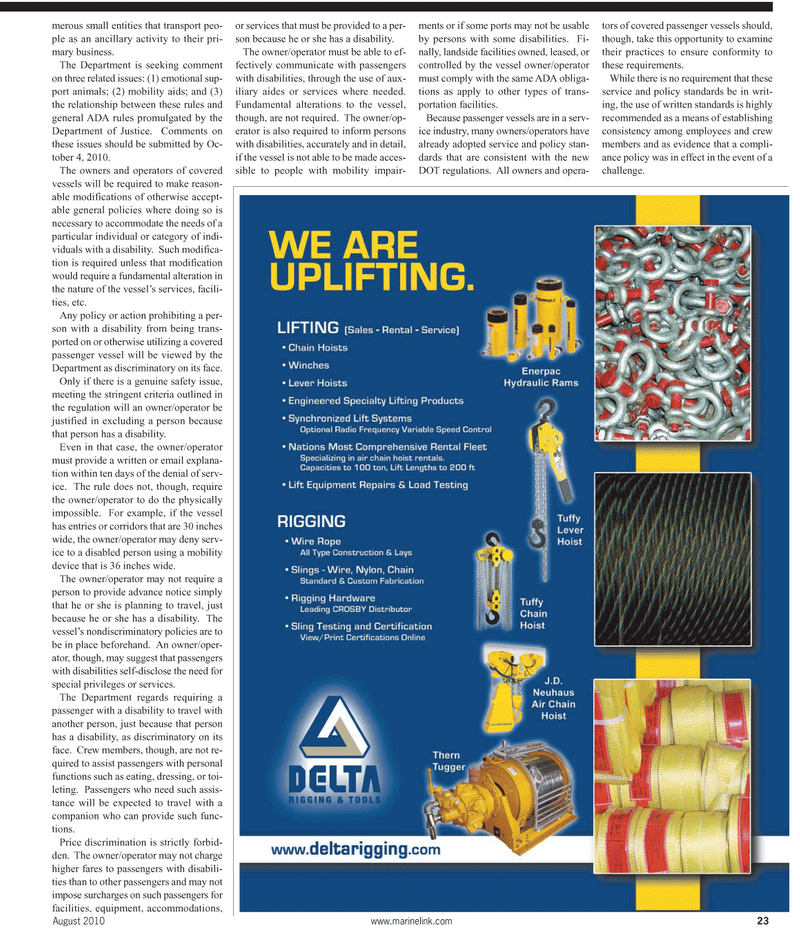
Page 23: of Maritime Reporter Magazine (August 2010)
The Electric Ship
Read this page in Pdf, Flash or Html5 edition of August 2010 Maritime Reporter Magazine
merous small entities that transport peo- ple as an ancillary activity to their pri- mary business.
The Department is seeking comment on three related issues: (1) emotional sup- port animals; (2) mobility aids; and (3) the relationship between these rules and general ADA rules promulgated by the
Department of Justice. Comments on these issues should be submitted by Oc- tober 4, 2010.
The owners and operators of covered vessels will be required to make reason- able modifications of otherwise accept- able general policies where doing so is necessary to accommodate the needs of a particular individual or category of indi- viduals with a disability. Such modifica- tion is required unless that modification would require a fundamental alteration in the nature of the vessel’s services, facili- ties, etc.
Any policy or action prohibiting a per- son with a disability from being trans- ported on or otherwise utilizing a covered passenger vessel will be viewed by the
Department as discriminatory on its face.
Only if there is a genuine safety issue, meeting the stringent criteria outlined in the regulation will an owner/operator be justified in excluding a person because that person has a disability.
Even in that case, the owner/operator must provide a written or email explana- tion within ten days of the denial of serv- ice. The rule does not, though, require the owner/operator to do the physically impossible. For example, if the vessel has entries or corridors that are 30 inches wide, the owner/operator may deny serv- ice to a disabled person using a mobility device that is 36 inches wide.
The owner/operator may not require a person to provide advance notice simply that he or she is planning to travel, just because he or she has a disability. The vessel’s nondiscriminatory policies are to be in place beforehand. An owner/oper- ator, though, may suggest that passengers with disabilities self-disclose the need for special privileges or services.
The Department regards requiring a passenger with a disability to travel with another person, just because that person has a disability, as discriminatory on its face. Crew members, though, are not re- quired to assist passengers with personal functions such as eating, dressing, or toi- leting. Passengers who need such assis- tance will be expected to travel with a companion who can provide such func- tions.
Price discrimination is strictly forbid- den. The owner/operator may not charge higher fares to passengers with disabili- ties than to other passengers and may not impose surcharges on such passengers for facilities, equipment, accommodations, or services that must be provided to a per- son because he or she has a disability.
The owner/operator must be able to ef- fectively communicate with passengers with disabilities, through the use of aux- iliary aides or services where needed.
Fundamental alterations to the vessel, though, are not required. The owner/op- erator is also required to inform persons with disabilities, accurately and in detail, if the vessel is not able to be made acces- sible to people with mobility impair- ments or if some ports may not be usable by persons with some disabilities. Fi- nally, landside facilities owned, leased, or controlled by the vessel owner/operator must comply with the same ADA obliga- tions as apply to other types of trans- portation facilities.
Because passenger vessels are in a serv- ice industry, many owners/operators have already adopted service and policy stan- dards that are consistent with the new
DOT regulations. All owners and opera- tors of covered passenger vessels should, though, take this opportunity to examine their practices to ensure conformity to these requirements.
While there is no requirement that these service and policy standards be in writ- ing, the use of written standards is highly recommended as a means of establishing consistency among employees and crew members and as evidence that a compli- ance policy was in effect in the event of a challenge.
August 2010 www.marinelink.com 23

 22
22

 24
24
